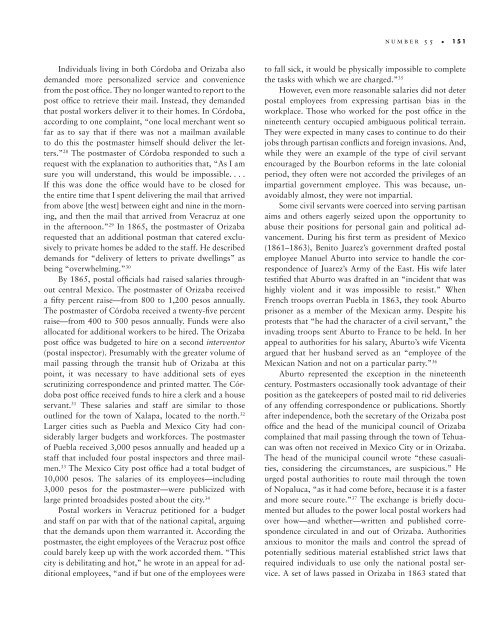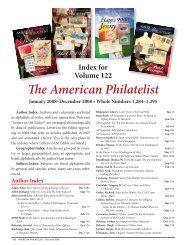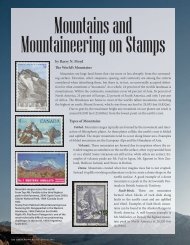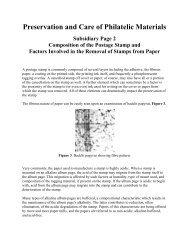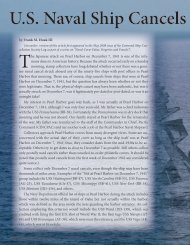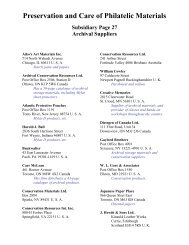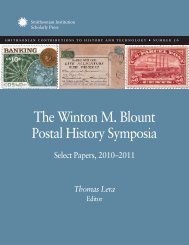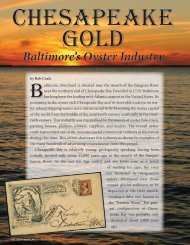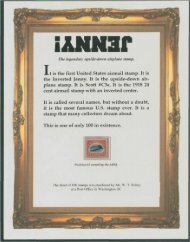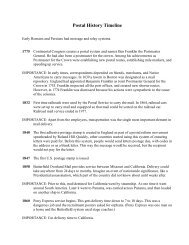The Winton M. Blount Postal History Symposia - Smithsonian ...
The Winton M. Blount Postal History Symposia - Smithsonian ...
The Winton M. Blount Postal History Symposia - Smithsonian ...
- No tags were found...
Create successful ePaper yourself
Turn your PDF publications into a flip-book with our unique Google optimized e-Paper software.
n u m b e r 5 5 • 1 5 1Individuals living in both Córdoba and Orizaba alsodemanded more personalized service and conveniencefrom the post office. <strong>The</strong>y no longer wanted to report to thepost office to retrieve their mail. Instead, they demandedthat postal workers deliver it to their homes. In Córdoba,according to one complaint, “one local merchant went sofar as to say that if there was not a mailman availableto do this the postmaster himself should deliver the letters.”28 <strong>The</strong> postmaster of Córdoba responded to such arequest with the explanation to authorities that, “As I amsure you will understand, this would be impossible. . . .If this was done the office would have to be closed forthe entire time that I spent delivering the mail that arrivedfrom above [the west] between eight and nine in the morning,and then the mail that arrived from Veracruz at onein the afternoon.” 29 In 1865, the postmaster of Orizabarequested that an additional postman that catered exclusivelyto private homes be added to the staff. He describeddemands for “delivery of letters to private dwellings” asbeing “overwhelming.” 30By 1865, postal officials had raised salaries throughoutcentral Mexico. <strong>The</strong> postmaster of Orizaba receiveda fifty percent raise—from 800 to 1,200 pesos annually.<strong>The</strong> postmaster of Córdoba received a twenty- five percentraise—from 400 to 500 pesos annually. Funds were alsoallocated for additional workers to be hired. <strong>The</strong> Orizabapost office was budgeted to hire on a second interventor(postal inspector). Presumably with the greater volume ofmail passing through the transit hub of Orizaba at thispoint, it was necessary to have additional sets of eyesscrutinizing correspondence and printed matter. <strong>The</strong> Córdobapost office received funds to hire a clerk and a houseservant. 31 <strong>The</strong>se salaries and staff are similar to thoseoutlined for the town of Xalapa, located to the north. 32Larger cities such as Puebla and Mexico City had considerablylarger budgets and workforces. <strong>The</strong> postmasterof Puebla received 3,000 pesos annually and headed up astaff that included four postal inspectors and three mailmen.33 <strong>The</strong> Mexico City post office had a total budget of10,000 pesos. <strong>The</strong> salaries of its employees—including3,000 pesos for the postmaster—were publicized withlarge printed broadsides posted about the city. 34<strong>Postal</strong> workers in Veracruz petitioned for a budgetand staff on par with that of the national capital, arguingthat the demands upon them warranted it. According thepostmaster, the eight employees of the Veracruz post officecould barely keep up with the work accorded them. “Thiscity is debilitating and hot,” he wrote in an appeal for additionalemployees, “and if but one of the employees wereto fall sick, it would be physically impossible to completethe tasks with which we are charged.” 35However, even more reasonable salaries did not deterpostal employees from expressing partisan bias in theworkplace. Those who worked for the post office in thenineteenth century occupied ambiguous political terrain.<strong>The</strong>y were expected in many cases to continue to do theirjobs through partisan conflicts and foreign invasions. And,while they were an example of the type of civil servantencouraged by the Bourbon reforms in the late colonialperiod, they often were not accorded the privileges of animpartial government employee. This was because, unavoidablyalmost, they were not impartial.Some civil servants were coerced into serving partisanaims and others eagerly seized upon the opportunity toabuse their positions for personal gain and political advancement.During his first term as president of Mexico(1861–1863), Benito Juarez’s government drafted postalemployee Manuel Aburto into service to handle the correspondenceof Juarez’s Army of the East. His wife latertestified that Aburto was drafted in an “incident that washighly violent and it was impossible to resist.” WhenFrench troops overran Puebla in 1863, they took Aburtoprisoner as a member of the Mexican army. Despite hisprotests that “he had the character of a civil servant,” theinvading troops sent Aburto to France to be held. In herappeal to authorities for his salary, Aburto’s wife Vicentaargued that her husband served as an “employee of theMexican Nation and not on a particular party.” 36Aburto represented the exception in the nineteenthcentury. Postmasters occasionally took advantage of theirposition as the gatekeepers of posted mail to rid deliveriesof any offending correspondence or publications. Shortlyafter independence, both the secretary of the Orizaba postoffice and the head of the municipal council of Orizabacomplained that mail passing through the town of Tehuacanwas often not received in Mexico City or in Orizaba.<strong>The</strong> head of the municipal council wrote “these casualities,considering the circumstances, are suspicious.” Heurged postal authorities to route mail through the townof Nopaluca, “as it had come before, because it is a fasterand more secure route.” 37 <strong>The</strong> exchange is briefly documentedbut alludes to the power local postal workers hadover how—and whether—written and published correspondencecirculated in and out of Orizaba. Authoritiesanxious to monitor the mails and control the spread ofpotentially seditious material established strict laws thatrequired individuals to use only the national postal service.A set of laws passed in Orizaba in 1863 stated that


